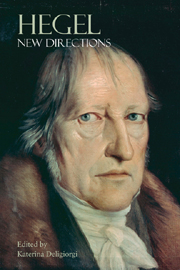Book contents
- Frontmatter
- Contents
- Contributors
- Acknowledgements
- Abbreviations
- Introduction: On reading Hegel today
- 1 Hegel on conscience and the history of moral philosophy
- 2 The apperceptive I and the empirical self: towards a heterodox reading of “Lordship and Bondage” in Hegel's Phenomenology
- 3 Hegel, McDowell and recent defences of Kant
- 4 Substance, subject and infinity: a case study of the role of logic in Hegel's system
- 5 Dialectic as logic of transformative processes
- 6 Hegel, ethics and the logic of universality
- 7 Recognition and reconciliation: actualized agency in Hegel's Jena Phenomenology
- 8 The contemporary relevance of Hegel's practical philosophy
- 9 Catching up with history: Hegel and abstract painting
- 10 New directions in Hegel's philosophy of nature
- 11 Hegel and the gospel according to Immanuel
- 12 What is conceptual history?
- 13 On Hegel's interpretation of Aristotle's psyche: a qualified defence
- Bibliography
- Index
Introduction: On reading Hegel today
- Frontmatter
- Contents
- Contributors
- Acknowledgements
- Abbreviations
- Introduction: On reading Hegel today
- 1 Hegel on conscience and the history of moral philosophy
- 2 The apperceptive I and the empirical self: towards a heterodox reading of “Lordship and Bondage” in Hegel's Phenomenology
- 3 Hegel, McDowell and recent defences of Kant
- 4 Substance, subject and infinity: a case study of the role of logic in Hegel's system
- 5 Dialectic as logic of transformative processes
- 6 Hegel, ethics and the logic of universality
- 7 Recognition and reconciliation: actualized agency in Hegel's Jena Phenomenology
- 8 The contemporary relevance of Hegel's practical philosophy
- 9 Catching up with history: Hegel and abstract painting
- 10 New directions in Hegel's philosophy of nature
- 11 Hegel and the gospel according to Immanuel
- 12 What is conceptual history?
- 13 On Hegel's interpretation of Aristotle's psyche: a qualified defence
- Bibliography
- Index
Summary
Whatever happens, every individual is a child of his time; so philosophy too is its own time apprehended in thoughts.
Hegel, Philosophy of Right, 11What is a timely reading of Hegel? In what ways does Hegel's philosophy speak to current concerns? These are the guiding questions for the essays gathered in this volume, which explore different aspects of Hegel's thought in the context of contemporary philosophical debates. The thematic range and variety of perspectives represented here are signs of the fertility of the continuing engagement with his ideas. It is the purpose of this Introduction to examine the reasons for this sustained interest and to look at some of the different ways in which Hegel is read today.
Agreement about Hegel's lasting significance is more easily secured than agreement about the nature of his achievement. There is little dispute over the plurality of projects – including monism, pluralism, metaphysical apriorism and pragmatism – that have claimed Hegelian inspiration. Such variety of interpretation is intimately related to the critical animus that continues to pervade evaluations of his legacy today. A clear lesson to be drawn from the reception history of Hegel's thought is that opposition to his ideas has been a vital force in instigating renewed engagement with his philosophy. This, in turn, goes some way towards explaining the diversity of approaches to his work. The question “why his constituency of friends and foes is so heterogeneous?” (Stern 2002: xii) must be addressed alongside the question why Hegel is the thinker “with the best and the worst reputation” (Pinkard 2002: 217).
- Type
- Chapter
- Information
- HegelNew Directions, pp. 1 - 16Publisher: Acumen PublishingPrint publication year: 2006



